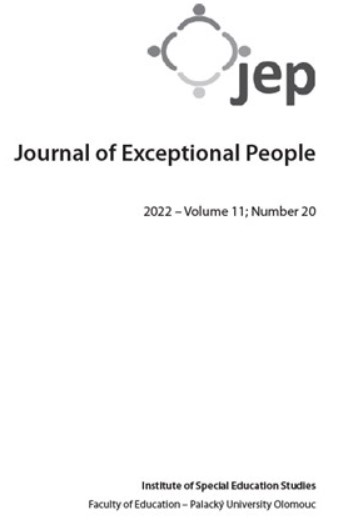Combination therapy for patients with a history of ischemic stroke: selected approaches based on special education and psychology in a systematic case study
Combination therapy for patients with a history of ischemic stroke: selected approaches based on special education and psychology in a systematic case study
Author(s): Michal Vostrý, Ilona Pešatová, Barbora Lanková, Otakar Fleischmann, Jaroslava JelínkováSubject(s): Educational Psychology, Cognitive Psychology, Health and medicine and law, Inclusive Education / Inclusion, Pedagogy
Published by: Univerzita Palackého v Olomouci
Keywords: Ischemic stroke; motor skills; rehabilitation; special education; psychology; helping professions; comprehensive rehabilitation;
Summary/Abstract: The content of the article encompasses the results of a research survey of a patient with a history of ischemic stroke (hereinafter referred to as ICMP, according to ICD-10; I63 cerebral infarction and I69.3 – consequences of cerebral infarction). The aim of the research was to find out the effect of combination therapy using long-term special educational (speech therapy and music therapy), occupational therapy, and psychological interventions on the development of cognitive and fatal functions of patients after ICMP (cognitive rehabilitation). The paper deals with the possibilities of development and support of individuals after the disease with a possible correction of deficits from a multidisciplinary point of view. The person was selected by random, stratified selection and corresponded to relevant characteristics in advance (age over 45 years, acute ICMP, cognitive and fatal disorder, hospitalization). The selected person participated in the research (female, 47 years old, acute ischemic stroke – March 12, 2021). For our needs, the therapy was focused on special educational care (speech therapy, cognitive rehabilitation, music therapy) and psychological intervention (psychic intervention and psychotherapy). A physiotherapist and an occupational therapist were present during hospitalization and post-hospitalization care. In the implemented research process, we point out the selected case study of the person, which corresponded to the relevant features, and the design of therapy with a focus on special education and psychology. The results of the research point to the fact that when working with patients with a history of ICMP, there is a need for regular multidisciplinary cooperation of an occupational therapist, a physiotherapist, a special educator (speech therapist, music therapist), and a psychologist. The given professions focus on specific areas of support with a focus on cognitive, fatal, and motor functions with the support of social adaptability.
Journal: Journal of Exceptional People
- Issue Year: 11/2022
- Issue No: 20
- Page Range: 141-155
- Page Count: 15
- Language: English

